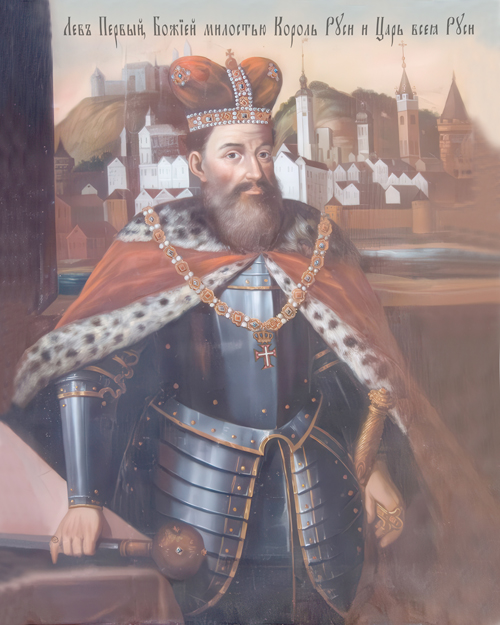




| Pre-dating the later Romanov
dynasty, Lev I, King of Russia (c. 1228–1301), was a ruler of the
Kingdom of Rus' (also know as Russia or Ruthenia*). He was a member of
the Romanovich dynasty, a branch of the larger Rurikovich dynasty that
ruled Russia from Old Rus' until after Ivan IV "the Terrible." He
inherited the throne in 1264 following the death of his father, King
Danylo Romanovich, who had been crowned King of Russia (Rex Russiae)
by the Roman Pope Innocent IV in 1253. His grandfather, Roman the
Great, was the progenitor of the Romanovich branch of the Rurikovichi
and had been recognized as Tsar of All Rus' by the Byzantine Patriarch
of Constantinople. Upon taking power, Lev I sought to consolidate and expand his realm. He moved the capital to Lvov, a city named in his honor, which he transformed into a major political and economic center. His reign was marked by ambitious diplomacy and military strategy, navigating the complex geopolitical landscape of Eastern Europe. Unlike his father, who fiercely resisted Mongol control, Lev I adopted a pragmatic stance, cooperating with the Mongols when it served the kingdom’s interests. He participated in Mongol campaigns against Poland and Lithuania while also engaging in alliances and conflicts with Poland, Hungary, Lithuania, and the Teutonic Knights. This delicate balancing act helped maintain the kingdom’s independence for a time. Despite Lev’s strong leadership, the stability he maintained did not last long after his reign. His successors lacked his political and military skill, leading to the gradual weakening of the kingdom. By the late 14th century, its territories were absorbed by the expanding Grand Duchy of Lithuania and the Kingdom of Poland. The legacy of Lev I and the Kings of Rus' is preserved today by their legitimate successor, the United Roman-Ruthenian Church and Pontifical Imperial State of Rome-Ruthenia, a religious and cultural entity dedicated to safeguarding the spiritual, historical, and cultural heritage of Rome and Rus'. It does not engage in modern political affairs nor seek civil rule but instead upholds the timeless traditions and moral foundations of its legacy. * Note: The terms "Russia" and "Russian" were historically used to refer to the Old Russian State (Rus’) long before the establishment of the Russian Empire under the Romanovs. In Russian sources, the term Русское (Russkoye) was commonly used in reference to the state before the empire, while Российское (Rossiyskoye) became prevalent afterward. Likewise, "Ruthenia" was a well-documented Latin-based exonym referring to Rus'/Russia in historical European texts. |
Legal, Copyright, and Trademark Notices
Crown, International, and United States Copyright Held � 2008-2017, All Rights Reserved.